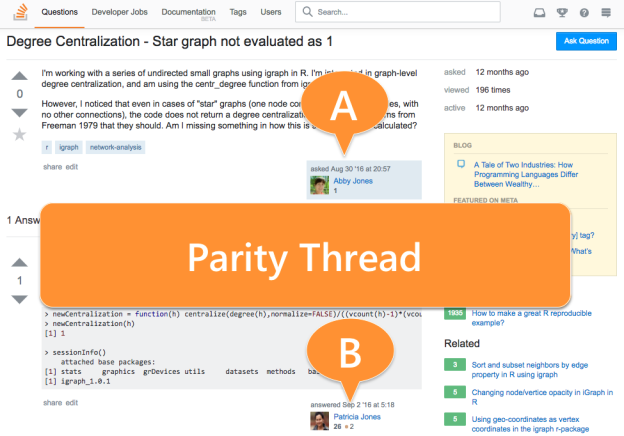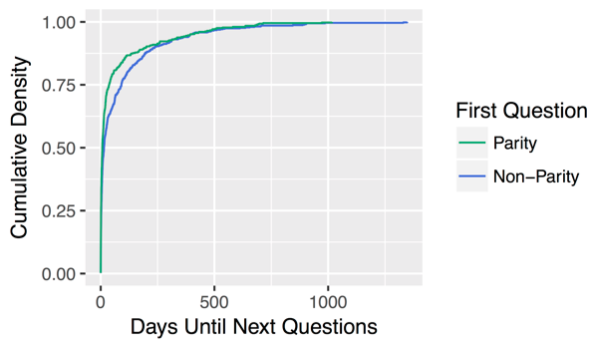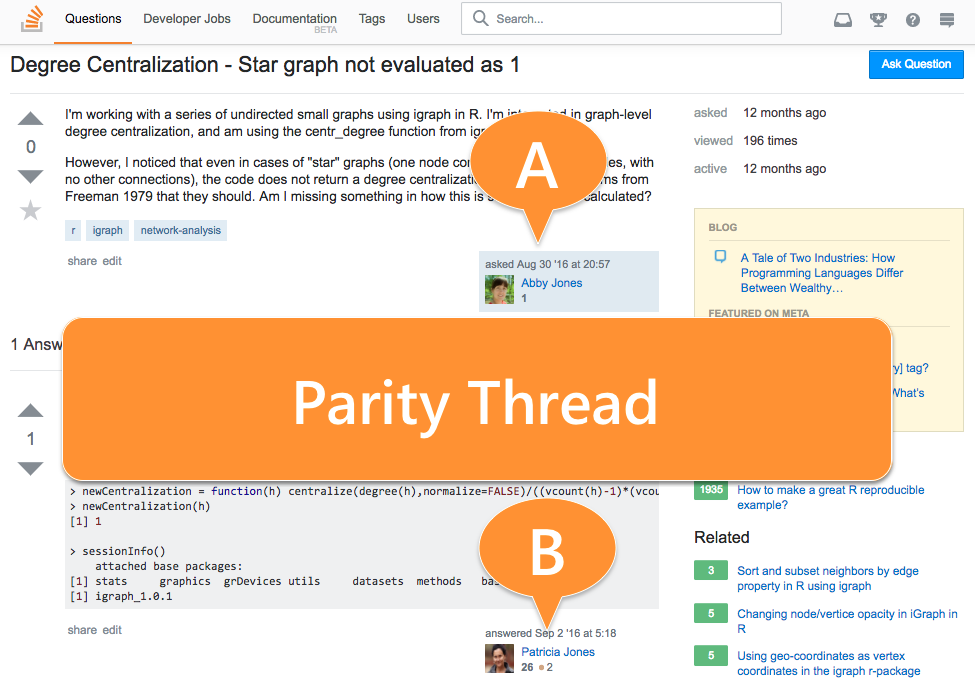Motivation
It’s pretty challenging to post online when you don’t see many people like you. When multiplied with the fact that the community size can seem intimidatingly large, users can be even further discouraged from participating. In a recent study we conducted about Stack Overflow participation of women, subjects mentioned that one reason they not post on Stack Overflow is that, “They are just not even on the same race track.” In this work, we investigate how exposure to peers can affect the likelihood of further activity. We call this notion of observing people on the same “race track” or having similar individuals to compare oneself peer parity.
What is Peer Parity?
When an individual can identify with at least one other peer when interacting in a community.
With this definition, parity could be in the instance of men, but since there exist many more occurrences to where men find parity than women, we decided to serve the underrepresented community of women for this study.
How we did it?
Data set. Using Stack Exchange’s data archive, we extracted user and post data. Then we generated the genders of the user extracted by modifying an existing Gender Computing Tool. Our modified tool uses the first name of user display names on Stack Overflow and achieves higher precision among identifiable women. Of the 5,987,284 users we extracted, we identified 363,133 women. Of the women we identified, only 32% of have ever posted a question.

For this analysis, we had a strict definition of peer parity:
Parity = more than one distinct woman on a thread based on Q&A
Non-Parity = threads that only have one distinct woman
For example the figure above demonstrates a thread that would classify as parity.
Approach.
Step 1. Selected 1000 women who posted more than 1 question
Step 2. Record their reputation points and badges
Step 3. Record date of their first and second activity
Step 4. Identify if first and second activity was parity or non-parity
Step 5. Statistical comparison!
Findings
We found a significant difference in types of second activity after participating on a parity or non-parity thread (p = 2.799e- 06, α =.05), which was either posting a question(N = 833) or posting an answer(N = 167). We found a significant difference in the time between posts for women who asked a question on parity threads in comparison to non-parity threads (p = 1.83e-05, α =.05). The cumulative time differences by posts are demonstrated in the figure below. However, we did not find a significant difference in reputation points or number of badges.

Simply put:
Women who are answered by other women reengage sooner.
However, they do not have higher reputation.
Implications
Sharing success. The very idea of being transparent about a community problem may have played a factor in the increased interest in the site. Perhaps one way to inspire and increase others to participate is to showcase top-rated questions asked by women. This will not only demonstrate how to post successful questions on Stack Overflow, but also shows the diverse set of users contributing.
Paired guidance. As we found peer parity can influence participation, we hypothesize that building mentorship programs around shared identity can be a strong way to build communities and encourage participation for a broad audience.Mentorship is a bidirectional relationship—both parties have something to gain. Encouraging users to seek guidance can benefit both the mentor, providing guidance, and the mentee, seeking guidance.
Revealing user identity. It can be difficult for users to separate from their identity in public spaces, furthermore, they should not have to. We should embrace and support users who wish to disclose this information. Allowing users the opportunity to bring their whole self into a community where they seek help may just be the encouragement they need to be active contributors
More?
Our research paper, Someone Like Me: How Does Peer Parity Influence Participation of Women on Stack Overflow? by Denae Ford, Alisse Harkins, and Chris Parnin was recently accepted this year at VL/HCC, IEEE Symposium on Visual Languages and Human-Centric Computing. This year’s conference will be taking place in Raleigh, North Carolina from October 11 -14, 2016. The paper is now available online.
Questions? Comments? Concerns? Let us know below!
